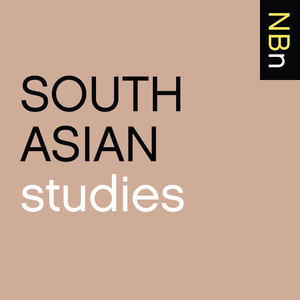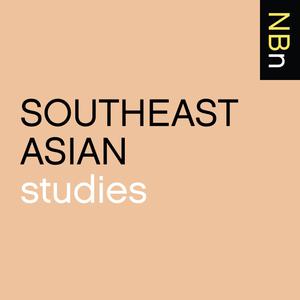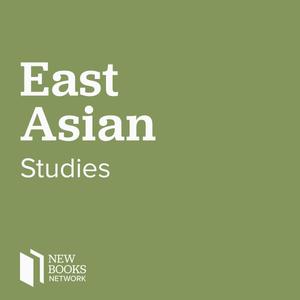
New Books in South Asian Studies
Interviews with Scholars of South Asia about their New Books
- 24 minutes 23 secondsIndia’s Land Mafia: A Discussion with Chiara Arnavas
Who and what are India’s land mafia? How do they operate, and why have they become so crucial to India’s land market? In this episode, we are joined by Chiara Arnavas for a discussion on the emergence over the past decades of a dynamic Indian land mafia that is centrally involved in moving land around, freeing it up for new uses, and passing it onto other actors for mega-profits. We analyze how the land mafia works, and what the implications are for social inequalities along the lines of class, caste, gender, and religion.
Chiara Arnavas is a Doctoral Research Fellow at the University of Oslo
Your host Kenneth Bo Nielsen is a social anthropologist and the leader of the Centre for South Asian Democracy at the University of Oslo.
Learn more about your ad choices. Visit megaphone.fm/adchoices
Support our show by becoming a premium member! https://newbooksnetwork.supportingcast.fm/south-asian-studies
24 January 2025, 9:00 am - 49 minutes 6 secondsAvinash Paliwal, "India's Near East: A New History" (Oxford UP, 2024)
After student protests toppled Bangladesh prime minister Sheikh Hasina last year, New Delhi and Dhaka have been at odds. Indian politicians complain about Hindus being mistreated in the Muslim-majority country; Bangladesh’s interim government fears that Hasina may launch a bid to return to power from India.
It’s the latest development in what’s become an extremely complicated environment in what Avinash Paliwal calls “India’s Near East”: India, Bangladesh (or East Pakistan before the 1970s), and Myanmar (or Burma before the 1980s). As Avinash explains his book India's Near East: A New History (Hurst: 2024), successive Indian leaders tried to get a handle on international tensions and ethnic conflict—and with a major external threat in China looming in the distance.
Avinash Paliwal is Reader in International Relations at SOAS University of London, specialising in South Asian strategic affairs. A former journalist and foreign affairs analyst, he is also the author of My Enemy's Enemy: India in Afghanistan from the Soviet Invasion to the U.S. Withdrawal (Hurst: 2017)
You can find more reviews, excerpts, interviews, and essays at The Asian Review of Books, including its review of India’s Near East. Follow on Twitter at @BookReviewsAsia.
Nicholas Gordon is an editor for a global magazine, and a reviewer for the Asian Review of Books. He can be found on Twitter at@nickrigordon.
Learn more about your ad choices. Visit megaphone.fm/adchoices
Support our show by becoming a premium member! https://newbooksnetwork.supportingcast.fm/south-asian-studies
23 January 2025, 9:00 am - 40 minutes 48 secondsGidi Ifergan, "The Discerning Clear Gaze of Yoga" (Equinox, 2024)
Gidi Ifergan's The Discerning Clear Gaze of Yoga (Equinox, 2024) explores the road map of yoga as reflected in the Yogasūtra of Patañjali (third century CE) and the Sāṁkhyakārikā of Iśvarakṛṣṇa (350–450 CE) which leads to the rise of this discerning insight, evading interpretations motivated by naivety on the one hand, and excessive suspicion on the other. Inspired by the psychology of yoga, the author offers a meditation focused on the sense of self and the cultivation of a discerning clear gaze.
Learn more about your ad choices. Visit megaphone.fm/adchoices
Support our show by becoming a premium member! https://newbooksnetwork.supportingcast.fm/south-asian-studies
23 January 2025, 9:00 am - 1 hour 10 minutesAshish Avikunthak, "Bureaucratic Archaeology: State, Science and Past in Postcolonial India" (Cambridge UP, 2022)
Bureaucratic Archaeology: State, Science and Past in Postcolonial India (Cambridge UP, 2022) presents a novel ethnographic examination of archaeological practice within postcolonial India, focusing on the Archaeological Survey of India (ASI) as a site where scientific knowledge production intersects with state bureaucracy. Through granular analysis of ASI's quotidian operations, this monograph demonstrates how archaeological micro-practices materially influence the construction of political and religious identities, while simultaneously serving as empirical evidence in India's highest judicial proceedings.
This unprecedented study illuminates the epistemological ecology of postcolonial knowledge production from within the bureaucratic apparatus itself. As the first book-length investigation of archaeological practice beyond the Euro-American tradition, it reveals how non-Western archaeological theory and methodology generate distinct forms of knowledge, thereby expanding our understanding of archaeology's role in postcolonial state formation.
About the Author:
Ashish Avikunthak is a distinguished scholar working at the intersection of archaeology, cultural anthropology, and avant-garde filmmaking. He is Professor of Film Media at the University of Rhode Island's Harrington School of Communication, where his research bridges theoretical and practical approaches to cultural production. His experimental films have been exhibited internationally at prestigious institutions including Tate Modern, Centre Georges Pompidou, and Pacific Film Archive, as well as major film festivals such as Rotterdam and Locarno.
About the Host:
Stuti Roy has recently completed her MPhil in Modern South Asian Studies at the University of Oxford.
Learn more about your ad choices. Visit megaphone.fm/adchoices
Support our show by becoming a premium member! https://newbooksnetwork.supportingcast.fm/south-asian-studies
21 January 2025, 9:00 am - 55 minutes 46 secondsAmrita Narayanan, "Women's Sexuality and Modern India: In a Rapture of Distress" (Oxford UP, 2022)
Amrita Narayanan is a practicing Clinical Psychologist (Psy.D. 2007) and Psychoanalyst (Indian Psychoanalytic Society, 2019). She is the author of Women's Sexuality and Modern India: In a Rapture of Distress (Oxford University Press, 2023). She was the Editor of and essayist in The Parrots of Desire: 3000 years of Erotica in India (Aleph Books, 2018) a collection of poems, short prose and fiction in translation from Indian languages, linked by an introductory essay on the central themes in Indian erotic literature. She was an essayist for Pha(bu)llus: a cultural history of the Phallus (Harper Collins, 2020). Amrita is currently visiting faculty at Ashoka University where she teaches classes at the undergraduate and masters level.
Amrita's research interests are in cultural factors in psychotherapy and psychoanalysis, the psychodynamics of women's sexual agency, and how cultural factors shape the aesthetics of women's sexual agency. Her writing has appeared in academic journals such as Psychodynamic Practice and Psychoanalytic Review; newspapers such as The Hindu and The Indian Express; and popular press periodicals such as Outlook, Open Magazine India Today and The Deccan Herald. Amrita has received the Sudhir Kakar Prize for psychoanalytic writing, the Taylor and Francis Prize for Psychoanalytic writing, and the Homi Bhabha Fellowship.
The interviewer is Psychoanalyst and Writer, Ashis Roy, New Delhi.
Learn more about your ad choices. Visit megaphone.fm/adchoices
Support our show by becoming a premium member! https://newbooksnetwork.supportingcast.fm/south-asian-studies
18 January 2025, 9:00 am - 53 minutes 59 secondsJavaria Farooqui, "Romance Fandom in 21st-Century Pakistan: Reading the Regency" (Bloomsbury, 2024)
Romance Fandom in 21st-Century Pakistan: Reading the Regency (Bloomsbury, 2024) offers the first major study of English-speaking romance fandom in South Asia, providing a new reader-centric model that engages with romance readers as genre experts.
Here, she investigates the popular Anglophone romance reading community in Pakistan and develops a model for analysing genre romance novels through the lens of the readers' perspective and preferences. Using focus-group interviews and close textual analysis, her book explores where and how readers access books of their choice, and explains why the detailed descriptions of dresses, food and spaces in historical romance novels of the Regency era exemplify good taste for this distinctive readership. Sitting at the intersection of literary studies, genre studies, and fan studies, this book considers the reception of Anglophone romance fiction by reading communities of colour.
About the author: Javaria Farooqui is Assistant Professor of English and Literary Studies at COMSATS University Islamabad, Lahore Campus, Pakistan. Dr. Farooqui’s research interests fall across multiple disciplines and topic areas in the humanities and social sciences, including fan studies, book history, women’s writing and histories, digital humanities, language acquisition, popular romance studies, and reader response studies. She has published research that explores the reception and materiality of texts, the ramifications of colonization and its aftermath on a nation’s literary culture, gender-based violence, and the problematic reception of Anglophone movies in Pakistan.
Priyam Sinha recently graduated with a PhD from the National University of Singapore and has been awarded the Alexander Von Humboldt Postdoctoral Fellowship, starting 2025. She has interdisciplinary academic interests that lie at the intersection of film studies, critical new media industry studies, disability studies, affect studies, gender studies, and cultural studies. She can be reached at https://twitter.com/PriyamSinha
Learn more about your ad choices. Visit megaphone.fm/adchoices
Support our show by becoming a premium member! https://newbooksnetwork.supportingcast.fm/south-asian-studies
16 January 2025, 9:00 am - 44 minutes 29 secondsRoger R. Jackson, "Saraha: Poet of Blissful Awareness" (Shambhala, 2024)
The life and works of the mysterious Indian yogin, Saraha, who has inspired Buddhist practitioners for over a thousand years. Saraha, “the Archer,” was a mysterious but influential tenth-century Indian Buddhist tantric adept who expressed his spiritual realization in mystic songs (dohās) that are enlightening, shocking, and confounding by turns.
Saraha: Poet of Blissful Awareness (Shambhala, 2024) is the first book to attempt a thorough treatment of the context, life, works, poetics, and teachings of Saraha. It features a search for the “historical” Saraha through evidence provided by our knowledge of the medieval Indian context in which he likely lived, the biographical legends that grew up around him in Tibet, and the works attributed to him in Indic and Tibetan text collections; a consideration of the various guises in which Saraha appears in his writings (as poet, social and religious critic, radical gnostic thinker, and more); an overview of Saraha’s poetic and religious legacy in South Asia and beyond; and complete or partial translations, from Tibetan, of over two dozen works attributed to Saraha. These include nearly all his spiritual songs, from his well-known Dohā Trilogy to obscure but important expositions of mahāmudrā, as well as several previously untranslated works.
Learn more about your ad choices. Visit megaphone.fm/adchoices
Support our show by becoming a premium member! https://newbooksnetwork.supportingcast.fm/south-asian-studies
16 January 2025, 9:00 am - 41 minutes 9 secondsRichard H. Davis, "Religions of Early India: A Cultural History" (Princeton UP, 2024)
From its earliest recorded history, India was a place of remarkable and varied religious activity, ranging from elaborate sacrificial rituals and rigorous regimes of personal austerity to psycho-spiritual experimentation and utopian visions.
In Religions of Early India: A Cultural History (Princeton UP, 2024), Richard Davis offers a history of India’s myriad religious cultures that spans two thousand years, from 1300 BCE to 700 CE. Throughout, he emphasizes encounter, interaction, debate, critique, and borrowing among religious communities within a shared, changing social and political reality. The voices and visions of early India’s religions, Davis shows us, are fascinating in their multiplicity.
Learn more about your ad choices. Visit megaphone.fm/adchoices
Support our show by becoming a premium member! https://newbooksnetwork.supportingcast.fm/south-asian-studies
9 January 2025, 9:00 am - 56 minutes 7 secondsAlastair Gornall, "Rewriting Buddhism: Pali Literature and Monastic Reform in Sri Lanka, 1157–1270" (UCL Press, 2020)
Rewriting Buddhism: Pali Literature and Monastic Reform in Sri Lanka, 1157–1270 (UCL Press, 2020) is the first intellectual history of premodern Sri Lanka’s most culturally productive period. This era of reform (1157–1270) shaped the nature of Theravada Buddhism both in Sri Lanka and also Southeast Asia and even today continues to define monastic intellectual life in the region.
Alastair Gornall argues that the long century’s literary productivity was not born of political stability, as is often thought, but rather of the social, economic and political chaos brought about by invasions and civil wars. Faced with unprecedented uncertainty, the monastic community sought greater political autonomy, styled itself as royal court, and undertook a series of reforms, most notably, a purification and unification in 1165 during the reign of Parakramabahu I. He describes how central to the process of reform was the production of new forms of Pali literature, which helped create a new conceptual and social coherence within the reformed community; one that served to preserve and protect their religious tradition while also expanding its reach among the more fragmented and localized elites of the period.
Rewriting Buddhism is available for free open-access download at uclpress.com/buddhism.
Bruno M. Shirley is a PhD candidate at Cornell University, working on Buddhism, kingship and gender in medieval Sri Lankan texts and landscapes. He is on Twitter at @brunomshirley.
Learn more about your ad choices. Visit megaphone.fm/adchoices
Support our show by becoming a premium member! https://newbooksnetwork.supportingcast.fm/south-asian-studies
6 January 2025, 9:00 am - 1 hour 15 minutesIlanit Loewy Shacham, "Empire Inside Out: Religion, Conquest, and Community in Kṛṣṇadevarāya's Āmuktamālyada" (Oxford UP, 2024)
Examining the interplay of religion, history, and literature through a case study of King Krsnadevaraya's celebrated Telugu poem Āmuktamālyada, Ilanit Loewy Shacham showcases the groundbreaking worldview that this often-overlooked poem embodies. Krsnadevaraya (r.1509-1529) ruled over the Vijayanagara Empire during its heyday, and his monumental poem situates all power and authority not in the imperial center, but in the villages and temples at the empire's outskirts; not in the royal court, but in a religious community - a worldview radically different from how literary and political histories portray the king and his empire.
Empire Inside Out explores the Āmuktamālyada as a reflection of one of South Asia's most culturally complex periods, highlighting its rich religious, political, historical and ethnographic detail. Moreover, Loewy Shacham examines the Āmuktamālyada as the work of a king imparting personal insights on empire, kingship, and individuality - specifically, that it is possible to be unbounded by the institution of kingship that he himself embodies. This book demonstrates that Krsnadevaraya's text connects the imperial domain to the village and temple settings, and to the south Indian community of Srivaisnava devotees-and indeed that it situates the source of authority and power not in the royal court but in the margins, where Srivaisnavism originated, giving the far Tamil south a central role in its imperial vision.
Employing close textual analysis of the Āmuktamālyada, supplemented by a rich corpus of texts in different languages and genres, Empire Inside Out illuminates a piece of literature that has been fairly neglected, owing to the particularized linguistic and literary training required. The core of the book is based in the historical context of sixteenth-century Vijayanagara, from which it moves to the various pasts that helped shape the Āmuktamālyada, and to our contemporary times and the use of the text in constructing (at times rewriting) history.
Learn more about your ad choices. Visit megaphone.fm/adchoices
Support our show by becoming a premium member! https://newbooksnetwork.supportingcast.fm/south-asian-studies
5 January 2025, 9:00 am - 1 hour 12 minutesSwethaa S. Ballakrishnen, "Accidental Feminism: Gender Parity and Selective Mobility Among India’s Professional Elite" (Princeton UP, 2021)
In India, elite law firms offer a surprising oasis for women within a hostile, predominantly male industry. Less than 10 percent of the country's lawyers are female, but women in the most prestigious firms are significantly represented both at entry and partnership. Elite workspaces are notorious for being unfriendly to new actors, so what allows for aberration in certain workspaces?
Drawing from observations and interviews with more than 130 elite professionals, Accidental Feminism: Gender Parity and Selective Mobility Among India’s Professional Elite (Princeton UP, 2021) examines how a range of underlying mechanisms-gendered socialization and essentialism, family structures and dynamics, and firm and regulatory histories-afford certain professionals egalitarian outcomes that are not available to their local and global peers. Juxtaposing findings on the legal profession with those on elite consulting firms, Swethaa Ballakrishnen reveals that parity arises not from a commitment to create feminist organizations, but from structural factors that incidentally come together to do gender differently. Simultaneously, their research offers notes of caution: while conditional convergence may create equality in ways that more targeted endeavors fail to achieve, "accidental" developments are hard to replicate, and are, in this case, buttressed by embedded inequalities. Ballakrishnen examines whether gender parity produced without institutional sanction should still be considered feminist.
In offering new ways to think about equality movements and outcomes, Accidental Feminism forces readers to critically consider the work of intention in progress narratives.
Noopur Raval is a postdoctoral researcher working at the intersection of Information Studies, STS, Media Studies and Anthropology.
Learn more about your ad choices. Visit megaphone.fm/adchoices
Support our show by becoming a premium member! https://newbooksnetwork.supportingcast.fm/south-asian-studies
3 January 2025, 9:00 am - More Episodes? Get the App
Your feedback is valuable to us. Should you encounter any bugs, glitches, lack of functionality or other problems, please email us on [email protected] or join Moon.FM Telegram Group where you can talk directly to the dev team who are happy to answer any queries.
 New Books in Islamic Studies
New Books in Islamic Studies
 New Books in Southeast Asian Studies
New Books in Southeast Asian Studies
 New Books in East Asian Studies
New Books in East Asian Studies
 New Books in Language
New Books in Language
 Asian Studies Centre
Asian Studies Centre
 CogitAsia
CogitAsia